Search the Special Collections and Archives Portal
Search Results
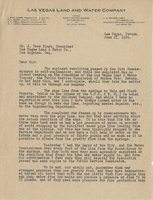
Letter from Walter R. Bracken (Las Vegas) to J. Ross Clark (Los Angeles), June 21, 1921
Date
Archival Collection
Description
Bracken appraising Clark of a complaint by the City Commission to the Nevada Public Service Commission and its resolution.
Text
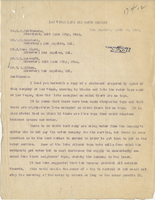
Letter from H. I. Bettis (Los Angeles) to C. O. Whittemore (Salt Lake City), W. H. Comstock (Los Angeles), J. Ross Clark (Los Angeles), W. H. Bancroft (Salt Lake City), and T. E. Gibbon (Los Angeles), April 12, 1906
Date
Archival Collection
Description
There were more lots in Las Vegas occupied than paid water connections, and the letter discusses the best method to get unauthorized users to pay.
Text
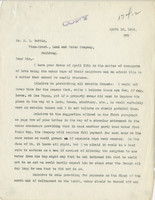
Letter to H. I. Bettis, April 13, 1906
Date
Archival Collection
Description
Bettis stating that prohibiting outside faucets would not solve the problem of unauthorized users, and would punish those who haven't given permission to neighbors who were using it anyway. It was also hard for owners to stand guard over their taps.
Text
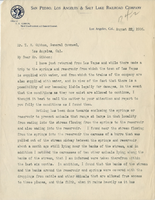
Letter from C. O. Whittemore (Los Angeles) to T. E. Gibbon (Los Angeles), August 22, 1906
Date
Archival Collection
Description
Whittemore stating that the reservoir at the Las Vegas Springs should be covered and a pipeline run since the open water system was an epidemic and a lawsuit waiting to happen.
Text

Letter from T. E. Gibbon to R. E. Wells, August 23, 1906
Date
Archival Collection
Description
Given the condition of the Las Vegas Springs, if an outbreak occurred, the Los Angeles & Salt Lake Railroad Company would undoubtedly be liable, so the situation needed to be rectified immediately.
Text
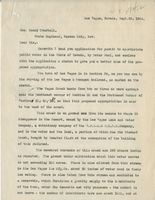
Letter from M. S. Beal (Las Vegas) to Henry Thurtell (Carson City, Nevada), September 25, 1906
Date
Archival Collection
Description
Lawyer notifying the state engineer that Peter Buol had applied for some water from the Las Vegas Creek, which entire length and the springs were on land owned by the railroad on the basis that some of the water was wasted and therefore available.
Text
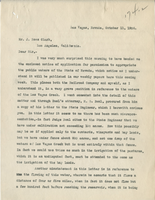
Letter from Walter R. Bracken (Las Vegas) to J. Ross Clark (Los Angeles), October 11, 1906
Date
Archival Collection
Description
Bracken informing Clark of Buol's attempt to appropriate water from the Las Vegas Creek for his own use.
Text
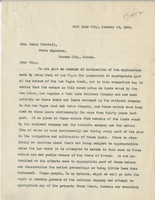
Letter from C. O. Whittemore (Salt Lake City) to Henry Thurtell (Carson City), October 13, 1906
Date
Archival Collection
Description
Letter to the Nevada State Engineer refuting Buol's application for water from the Las Vegas Creek since the Las Vegas Springs were on private property and entirely appropriated on that property.
Text
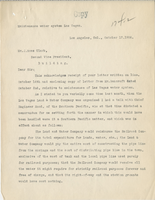
Letter from H. I. Bettis (Los Angeles) to J. Ross Clark, October 17, 1906
Date
Archival Collection
Description
Discussion of the financial aspects of the Las Vegas Land and Water Company in relation to the Railroad.
Text

Telegram from Walter R. Bracken (Las Vegas) to W. H. Guild (Salt Lake City, Utah), August 3, 1939
Date
Archival Collection
Description
Cleaning of the Las Vegas Creek was recommended while water was still running in order to avoid a lawsuit from the Stewart family.
Text
